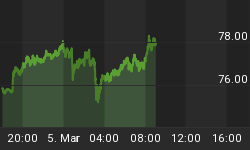The shape of this economic recovery will not be in a "V", as many pundits have promulgated, but instead may be the inversion of that letter...which will unfortunately look much more like a tepee. The upcoming downfall will surprise most investors who have been tricked into believing that a government can print and spend their way into prosperity.
Undeniably, there has been a superficial recovery in the economy, which was presaged by a 65% rebound in the S&P 500 since March of 2009. Third quarter GDP was positive -- albeit at a subpar and marginal 2.2% -- and Q4 of 2009 and Q1 of 2010 should also show positive economic growth as well. But most of that growth will come from an inventory rebuild and not from a sustainable increase in output.
But let me explain why this recovery will severely underperform those of previous recessions.
First we must realize what has previously led the economy out of a recession. It has historically been consumer spending accompanied by a recovery in the housing market. But we never had a nation-wide bubble in real estate before this previous period. After a bubble bursts, it takes decades before the asset in question can return to its former highs -- and that's without adjusting for inflation. For example, look at the gold market in 1980 and the NASDAQ market in the year 2000. The gold market didn't return to its nominal high until 2007, some 27 years after its bubble burst. And the NASDAQ is still more than 50% below its former high of 10 years ago. Therefore, if the nature of bubbles also applies to the housing market, we cannot count on real estate to lead the economy out of a recession. Evidence of the continued weakness in housing was displayed by last week's release of pending existing home sales, which dropped by 16%!
Many economists also believe that the consumer will spend us into a viable recovery. They are mistaken here as well. Household debt as a percentage of GDP was "just" 46% back in 1983 -- that was the last time the unemployment rate was 10%. Today household debt is 96% of GDP. That's correct; consumers have more than twice the level of debt as they did during the last serious recession. Can they be counted on to pile on more debt at this juncture? I think not.
But perhaps the most trenchant difference between this era and those of previous recessions is the direction of interest rates. In the early 1980's, the effective Federal Funds rate was close to 15% and declined to below 6% by the middle of that same decade, thanks to a precipitous drop in inflation. One cannot underestimate the huge tax cut that was given to investors and the boon transferred to businesses and consumers by having the cost of money plummet in such a short period of time. I would argue that the cost of money and the rate of inflation could and should increase significantly over the next few quarters. But even if I'm wrong, no one can contend that interest rates will provide a tailwind for the economy in 2010 as it did during the early 80's -- the last time unemployment was above 10%.
Finally, in order to believe the economy is on the brink of a lasting recovery we need to see that banks are lending money to the private sector in order to purchase capital goods that are used to create wealth. However, we see the opposite occurring today. Total Loans and Leases at commercial banks have decreased 7.7% from December 2009. The only money banks are lending is to the government. Without capital being extended to small businesses they cannot expand production or hire new employees.
The sad truth is that the real estate market will be in a malaise for years to come. The consumer will not be able to take on and service a substantially increased amount of debt. There will be no relief from falling interest rates or lower inflation and the cost of money may indeed rise despite the Fed's manipulations. And banks are frozen from lending precisely because the demand from money is down while the compulsion on the part of financial institutions to preserve their capital is overwhelming.
Knowing the truth will enable you to understand that the Fed will not be able to raise rates significantly in 2010. That means that the dollar stands unprotected and will resume its secular decline. Commodities will do well along with foreign stocks. Unfortunately, the rising price of oil and other commodities will put pressure on an already overburdened consumer, who already suffers from stagnant wage and labor growth.
The sooner we face these realities the sooner we can start to deal with them in a legitimate fashion. We can start by defending the value of our currency. Thereby ensuring that the upcoming double-dip recession is not also accompanied by yet more inflation.
Be sure to listen in on my Mid-Week Reality Check and to follow my blog Pentonomics
Follow me on Twitter: http://twitter.com/michaelpento















